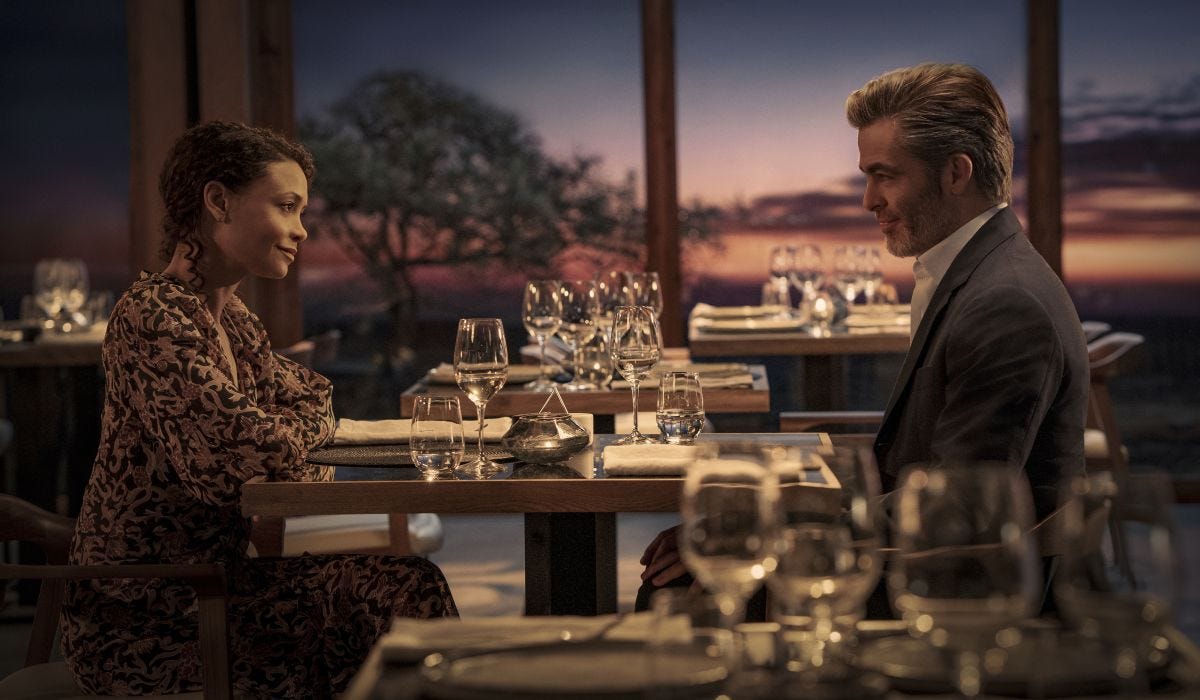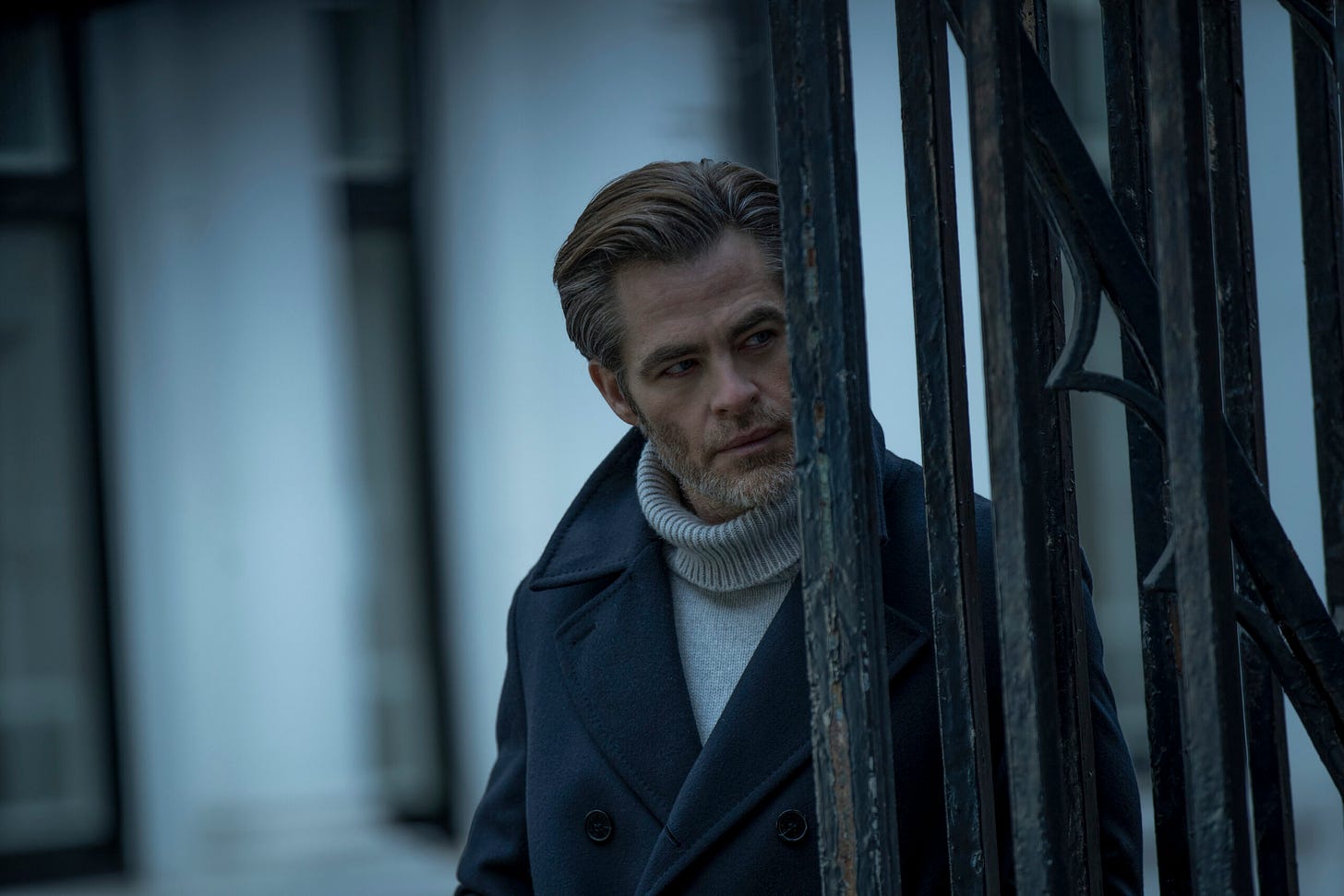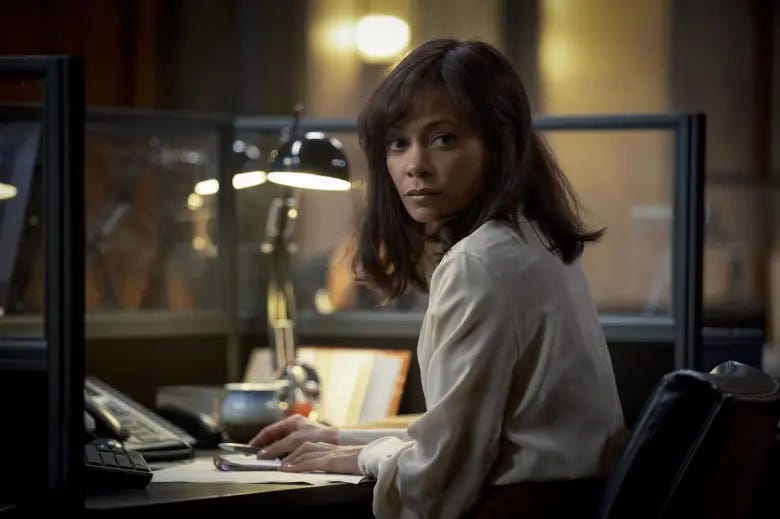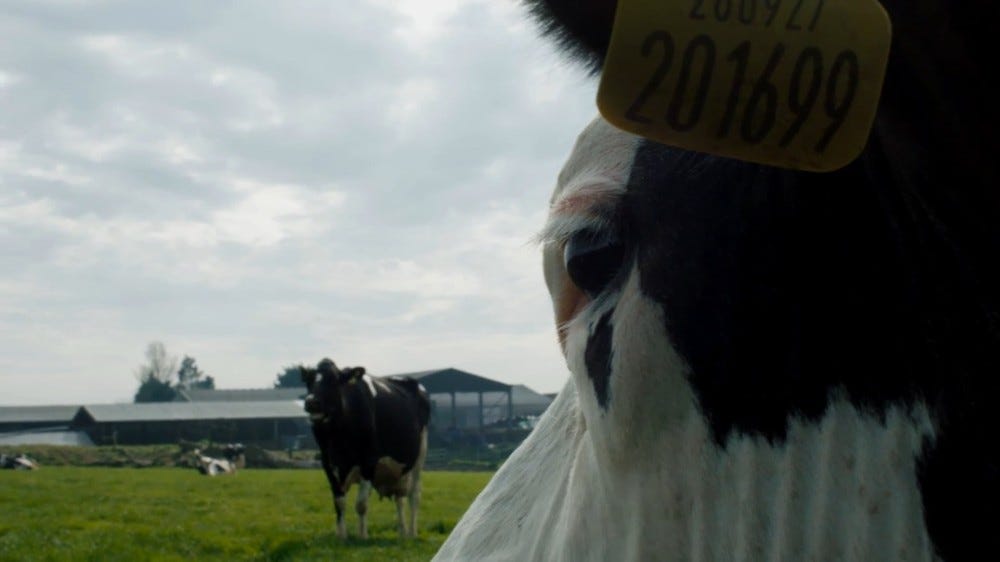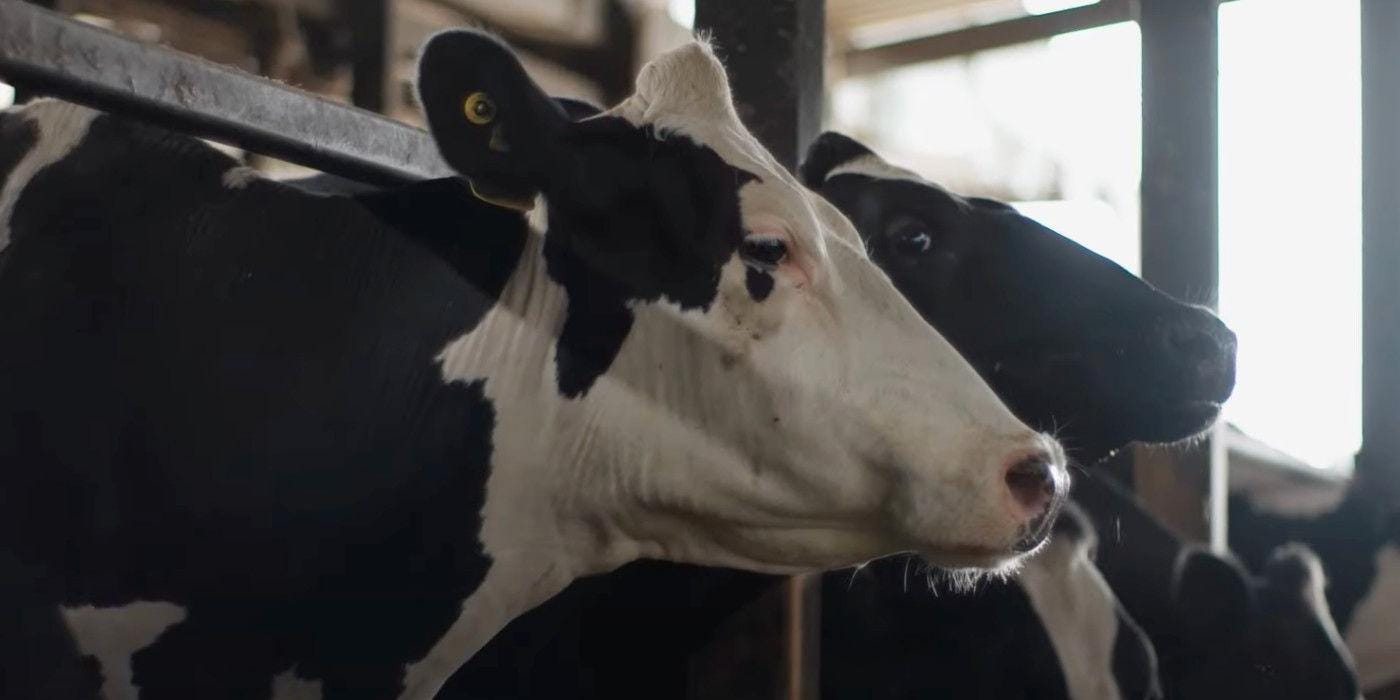What to Watch This Weekend: "All The Old Knives"
Plus: "Cow" and recommendations for every streaming platform.
The Nut Graf: “All The Old Knives” (in theaters and on Amazon Prime, *** stars out of ****) is a solid spy drama with fine performances. Director Andrea Arnold views life through the eyes of a British dairy cow in “Cow” (in theaters and available for rental, *** stars out of ****). Plus: Recommendations for all major streaming platforms.
Oh, look, someone made a movie for grown-ups! “All The Old Knives,” in theaters and on Amazon Prime, is a spy thriller with an overlay of romantic regret and several satisfying twists – it aims for the mature emotions and moral complexities of a John Le Carré novel and comes close enough for (dis)comfort. And it stars Chris Pine and Thandiwe Newton, two very attractive people who are very good at conveying shades of gray.
He’s Henry, a CIA field operative, and she’s Celia, an intelligence officer for the agency; years earlier, when they were both working for the Vienna field office, they had a torrid affair that ended after a terrorist hijacking of a commercial airliner went south. Everyone on board died, the agency got blamed for on-the-ground intelligence failures, and now, eight years later, Henry is dragged into the office of his boss (Laurence Fishburne) and told that there was a mole in the office that day and that it might have been Celia. He is dispatched to interrupt her new life as a wife and mother in California, ask questions, and (it’s heavily implied) take action.
So most of “All The Old Knives” takes place at a charming wine bar/restaurant in Carmel by the Sea, with flashbacks to scenes on the day of the hijacking and some important points between. It’s a complicated way of telling a story and the seams often show, but in general director Janus Metz, screenwriter Olen Steinhauer (adapting his own novel), and editors Mark Eckersley and Per Sandholt juggle the chronology with efficient clarity. One slightly goofy tracking shot around the Vienna CIA headquarters has Celia narrating an introduction to characters Henry already knows – exposition at its most obvious, but also a sign that the movie has a locked-room-mystery aspect to it as well. (The genre may as well be called Whack-a-Mole.)
What works is the way the light in that Carmel restaurant shifts from midday to sunset to night as the two rehash their past and the mood shifts from ruminative to regretful to incriminating. What also works is the chemistry between the two stars, who are both adept at conveying thought and strategy while remaining completely still and who have intriguingly mismatched stares, his ice-blue and piercing, hers dark brown and veiled. The sex scenes are unusually frank – downright European – and they’re hot; you believe how deeply Henry and Celia felt for each other physically and emotionally.
Pay attention to the characters on the sidelines, though: Jonathan Pryce as the head of the field office, an antsy old duffer; Orli Shuka as an informant who gets thrown under the bus with ambiguous consequences. Even the extras need keeping an eye on. “All The Old Knives” proceeds to a conclusion in which you might have guessed the Who but probably not the Why, and the series of revelations, handed out like bonus desserts, cap the meal and the movie with a gratifying and even moving sense of closure, after which everyone gets to go home or … elsewhere. It’s the kind of film that’s just right for streaming – not quite “big” enough for theaters and not a throwaway for in-flight viewing – and another sign that midrange moviemaking for adults has been booted off the big screen to make a home on VOD.
Britain’s Andrea Arnold is a fearless and unpredictable filmmaker, with some good, tough early movies in “Red Road” (2006) and “Fish Tank” (2009), a version of “Wuthering Heights” (2011) that has dirt under its fingernails, one gorgeous mood piece of lost youth in “American Honey” (2016), and then all of the second season of “Big Little Lies,” a huge hit on HBO with a name cast that included Meryl Streep. It’s somehow not surprising that Arnold would have spent the past four years filming a dairy cow, or that the resulting documentary, “Cow,” in theaters and available for on-demand rental, might wallop your emotions as thoroughly as anything Streep has done.
Indeed, there’s something of a bovine “Sophie’s Choice” to the early moment in which the titular cow, Luma, is separated from her newborn calf – forever; she’ll never see him again – and spends the next few scenes lowing in distress and refusing to eat. “Cow” doesn’t anthropomorphize Luma and doesn’t really need to; Arnold and her cinematographer Magda Kowalczyk just park the camera as close as she can to her subject, trying to see – to get us to see – the world through a cow’s eyes. Nor is she making an overt political statement. The owners and employees of Park Farm, in Kent, are seen as figures in the near and far background, going about their business without judgment by the camera. The “commentary” is mostly incidental, in the dairy barn’s piped-in pop songs — meant to keep the herds docile? Entertained? Only once does “Cow” stoop to what the director has called in interviews a “cheeky” bit; after Luma is impregnated by a bull, the film cuts to fireworks over the nighttime countryside.
We don’t need manipulation when what we see is plain enough testimony to an animal’s consciousness: The joy with which Luma kicks up her heels when she’s finally allowed out to pasture in the warm months, her balking and lowered head on the trek back to the sheds in fall. The way she attends to a newborn calf falling over its feet before returning to her own. The increasing protectiveness the farmers say that she shows over each successive calf. “Cow” stands comparison with “Gunda” (2020), Viktor Kosakovskiy’s brilliant documentary about the life of a pig; both films ask us to slow our metabolisms down to animal time, to animal perception, and both implicitly require us to examine why it is we humans do what we do to them. Both movies are hard and beautiful, and both movies break a viewer’s heart at different times. “Cow” is the lesser achievement only because we feel the weight of the filmmaker’s hand ever so slightly on the barnyard scale. It will deepen your understanding of the world we share with the creatures we use.
I’m going to try something new this week and on upcoming Fridays, which is to recommend one film per major streaming platform, so no matter which service you subscribe to, you’ll always have something to watch. Let me know if you this works for you.
Netflix: “Looper” (2012) – There have been a lot of big feelings about Bruce Willis in the past weeks and a lot of people revisiting his filmography in the wake of his announced retirement due to a diagnosis of aphasia. This smart, witty, fairly confusing time-loop thriller from the always excellent Rian Johnson (“Knives Out,” “The Last Jedi,” “Brick”) casts the actor as an older version of hitman Joseph Gordon-Levitt and gives his patented gruff exhaustion a moving emotional dimension.
Amazon Prime: “All The Old Knives,” see above.
Hulu: “Pig” (2021) – No, not another animal documentary, but a Nicolas Cage movie that sounds ridiculous but actually isn’t. He plays a star chef-turned-hermit on the trail of his stolen truffle pig ( I told you it sounds ridiculous) in a quest thorugh the Portland, OR, restaurant scene, that turns increasingly existential. Weird and unpredictable in a good way.
Paramount+: “Reign of Fire” (2002) — Absolutely demented post-apocalyptic creature feature in which dragons control the air over London, Christian Bale leads a ragtag resistance, and Matthew McConaughey shows up as a bald, nail-spitting Marine in one of the most consciously bonkers performances of his career. Great Saturday afternoon fun.
Peacock Network: “The Good Shepherd” (2006) — More damning CIA dramatic shenanigans. One of only two movies directed by Robert De Niro (the other is 1993’s “A Bronx Tale”), it’s an under-seen and underrated drama about an agency man (Matt Damon) and his slow moral corruption over the years.
AppleTV+: “Hala” (2019) – AppleTV+ offers only limited free movies and those are either produced by the service or cherry-picked from film festivals. “Hala,” written and directed by Minhal Baig and drawing from her own life, is one of the latter, a resonant Sundance drama about a Pakistani-American teenager (the charming Geraldine Viswanathan) in the Chicago suburbs and her desire, against her parent’s wishes, to be a normal skateboarding kid.
Criterion Channel: “This is Not a Burial, This is a Resurrection” (2019) – Mesmerizing, impressionistic fable of South African community and resistance, with an already legendary performance by the late Mary Twala Mhlongo as an elderly village woman mourning her son’s death in the mines and becoming a shamanistic leader of her people.
One last thing for my Boston area readers: The Independent Film Festival of Boston is coming around again starting April 27 and running through May 4. I’ll have more to say about it in the weeks to come, but I’m just really happy that this fest that started on a shoestring in 2003 has become, in its 20th iteration, the place to see the best movies from Sundance, SXSW, and all-new premieres before anyone else in town has a shot at them. You can find more information at the festival website, and the only other thing I’ll say is that the closing night film is the long-awaited “Marcel the Shell” feature film.
If you enjoyed this edition of Ty Burr’s Watch List, please feel free to share it with friends.
If you’re not a paying subscriber and would like to sign up for additional postings and to join the discussions, here’s how:
If you’re already a paying subscriber, I thank you for your generous support.




